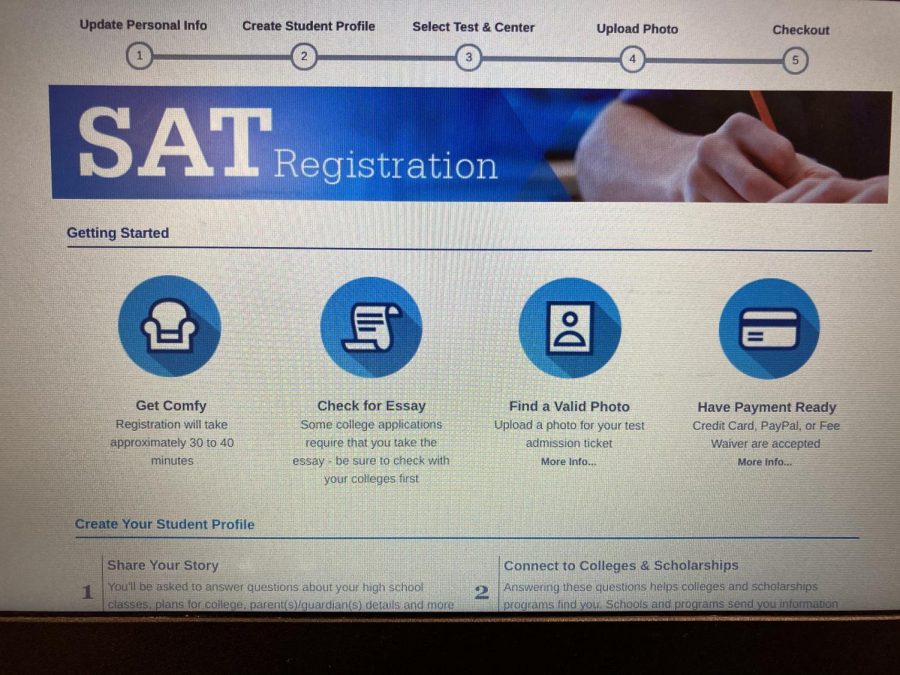5 perspectives on standardized testing
March 16, 2021
I opened my perfectly color-coordinated planner in dread already knowing what was printed on today’s date. The pretty pink font didn’t soften the words: Discovery Ed testing. The palms of my hands started sweating and the pressure to perform well on the test flooded my head. Quickly putting my planner away, I took some deep breaths right before my 7th-grade teacher handed me the test and I managed to keep my cool for the majority of the test. That is until my teacher announced, “You have five minutes remaining to finish the test.” Panic overwhelmed me; I had over 20 questions left.
I was a straight-A student, yet I couldn’t shake the feeling that getting over 20 questions wrong was going to affect my ability to get into advanced 8th-grade classes. I quickly began bubbling in random answers until my teacher’s words “Your five minutes are up” cut through the silence striking me with another wave of panic. I raised my hand to ask my teacher if I could have more time to finish only to be met with a harsh no. Tears formed in the corners of my eyes and eventually began pouring. I hit submit out of frustration and ran to the bathroom in hopes no one could see the tears sticking to my face.
Today, I laugh about this experience and can see how ridiculous stress over a 7th-grade Discovery Ed test was. However, at the time, it was enforced into my brain that my performance on standardized tests was extremely important. As I sat down five years later to take the SAT, my testing nerves were surprisingly lower than for my 7th-grade Discovery Ed test. Due to COVID-19, almost all universities allowed applications to be submitted without SAT scores, which significantly reduced my stress over my SAT score.
The dramatic shift to test-optional college applications has benefited the class of 2021 in reducing college application stress. Perhaps a successful year of no-standardized testing coupled with the growing skepticism of standardized tests will lead to a lasting change in the admissions process.
The possibility of removing standardized testing led me to inquire the following questions: What is the value of standardized testing? Are standardized tests a fair assessment of a student’s knowledge/ability? What are the biggest pros and cons of standardized testing? To find a wide variety of answers to the following questions, I contacted five educated professionals.
5 perspectives:
Bethany Willcock, WO Instructor and weekend SAT coordinator:
“The SAT is just another way that the idea of ability is measured. Colleges use it to see how well students can survive their first year; the military uses it to place people into jobs “best suited” for them. Yet, it does not reflect that of any student. Instead, I see it as reflecting the situation a person is in. How much a student is able to be prepared for this specific assessment, how much the student already uses Standard American English in their daily life, which is often reflected by the education level/social status of their parents/guardians, or how much a school has even prepared a student to take the test is what is truly assessed.”
“I teach the SAT Prep class not because I love the SAT, but because I was a student without those legs up. I would have to walk across the highway to the bookstore, sit in the back with my notebook hoping I wouldn’t get caught, and study out of the ACT prep books because my family couldn’t afford them. I was even only able to do this on nights I didn’t work and because my sisters were old enough to watch themselves, a luxury many students at WO don’t have. I knew I had to figure out the system in order to succeed in it. I teach the class to ensure all students can feel as supported as the elites on the East Coast that are trained to get into Ivy Leagues from birth. West Ottawa students deserve to show that they truly can succeed; the SAT is just another way that those who don’t know how can be excluded.”
Jaslee Carayol, College Board Director of Media Relations:
“Years of research have consistently demonstrated that the SAT is a valid predictor of first-year college success for all students, regardless of gender, race, or socioeconomic status. The questions on the SAT are more familiar because the content better reflects what students will already have learned in class.
The new SAT has undergone comprehensive item-level testing to ensure that the operational test forms are of the highest technical quality, both with regard to fairness and validity. Every question on the SAT is researched and pre-tested with a representative sample of students to ensure quality and prevent bias. High school teachers, college faculty, and other experts review each question multiple times to ensure that it reflects what evidence has shown to be essential for college readiness and success; frames the task clearly; is grade-appropriate; is fair to all students; and models good classroom instruction and productive student practice.
Research and evidence show the value of using SAT scores in context as one part of the admissions process:
- Considering test scores in context helps admissions officers make more equitable and inclusive admissions decisions.
- Test scores and grades together are the best way to predict success in college.
- When students take the SAT during the school day—as nearly a million did in 2020 thanks to the commitment from our state and district partners—they are more likely to apply and enroll in college.”
Carol Fritz, 28 years of college admissions experience:
“Test scores are the opportunity for a student to share how much information, over the course of their education, they have retained. It is not necessarily a measurement of a student’s overall knowledge. Each college/university has its own standard baseline test scores, they may use as a gauge, in determining the potential for a student’s future success at their institution. It is helpful and can be significant but it is not the only reason a student is admitted, waitlisted, deferred, or denied at any college or university. They can at times be useful in gaining insights, however, they are not the predictor of success. Pro: Tests can help to gain some insights about an individual’s comprehension of material. Con: As a society, we have taken testing and made it overly competitive. I would share again it is a moment to gain insights on some comprehension a student has at that specific time.”
Amy Masko, Grand Valley Professor and WO parent who opted her elementary/middle school children out of standardized tests:
“To protest the high-stakes testing practices that have become too common in schools. Standardized tests provide some information to parents, teachers, and kids about how the child is doing compared to others around the country, as well as give information on which schools are doing well, compared to others. The problem is that these tests have become high stakes, where there is an inordinate amount of pressure put on kids, increasing mental health stress (like test anxiety), and teachers and schools, which cause them to teach to the test, which narrows the curriculum. The narrowing of the curriculum is the biggest problem. Standardized testing gives a piece of information, and yes, that’s fair. It isn’t the only information, so to treat it as such, is the problem. In our high-stakes, uber-accountability-prone environment, the overemphasis on standardized tests is unfair. It narrows the curriculum and a generation of children have been robbed of a well-rounded education, especially in science and social studies, and the arts. Standardized tests have narrowed the curriculum to language arts and math as the main focus.”
Ann Kirkendall, WO Instructor:
“I am not a terribly big fan of standardized testing. I think that there is a difference between what a student knows and what a student can produce on a multiple-choice test. I think the ability of a multiple-choice question to really tap into a student’s knowledge and understanding is limited. A multiple-choice question is a pretty blunt tool to access a pretty complex thing. I do see that there is a place for them. I accept that colleges would like one standard thing to use to compare students from various schools. Some schools may be easier or harder than other schools and the standardized test is just one measure of know what does a student knows at this moment. However, I think that an admissions office should consider that one small puzzle piece in a student’s application because the students are so much more than their SAT score. There’s just so much evidence that so much of a standardized test score has more to do with a student’s socioeconomic status and upbringing and rather than likely their real potential. I also think that students mature at different rates and at the time that these benchmark tests are given, sometimes people just aren’t quite there yet. It doesn’t mean that they’re never going to get there it just means they’re not there yet so the idea that, for instance, an SAT scores going to be the be-all-and-end-all I think is incredibly short-sighted. I think that there’s so much value in human intelligence that simply cannot be measured on a (standardized) test. Even if you look at things that are evaluated, the SAT has a writing portion, but the writing skills that they evaluate are so limited when we think of all that writing encompasses. Test-taking is a skill that in some ways is related to course content but in some ways is a very different skill. I think that your ability to do well in a standardized test in part speaks your knowledge and impart speaks to your test-taking skills. As a teacher, the idea that I would spend time practicing test-taking skills which once you leave formal education is a completely impractical life skill, I have not taken a multiple-choice test since I started my career and I don’t know any other adult who has either, so that seems like time that could be better spent.”




